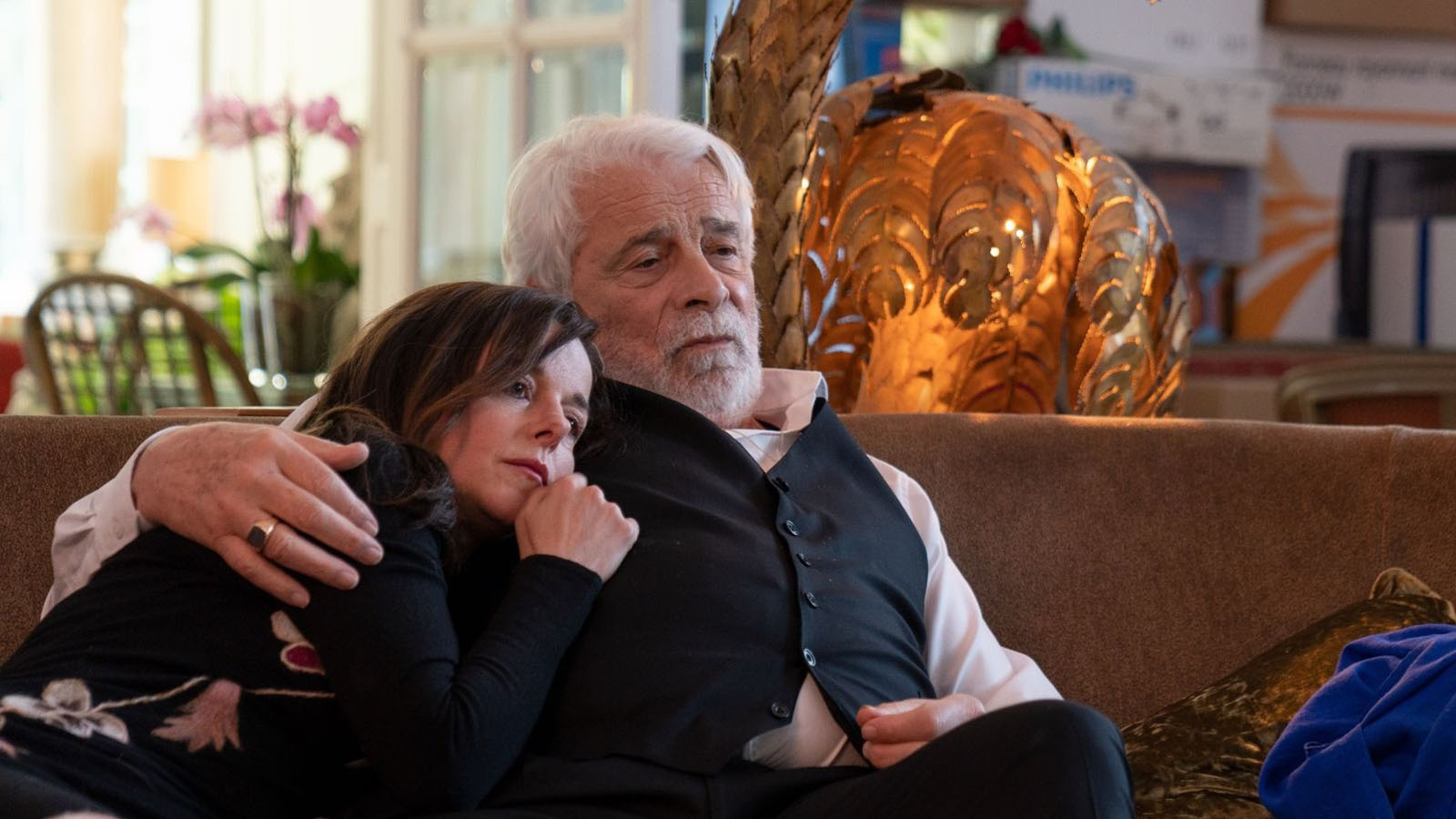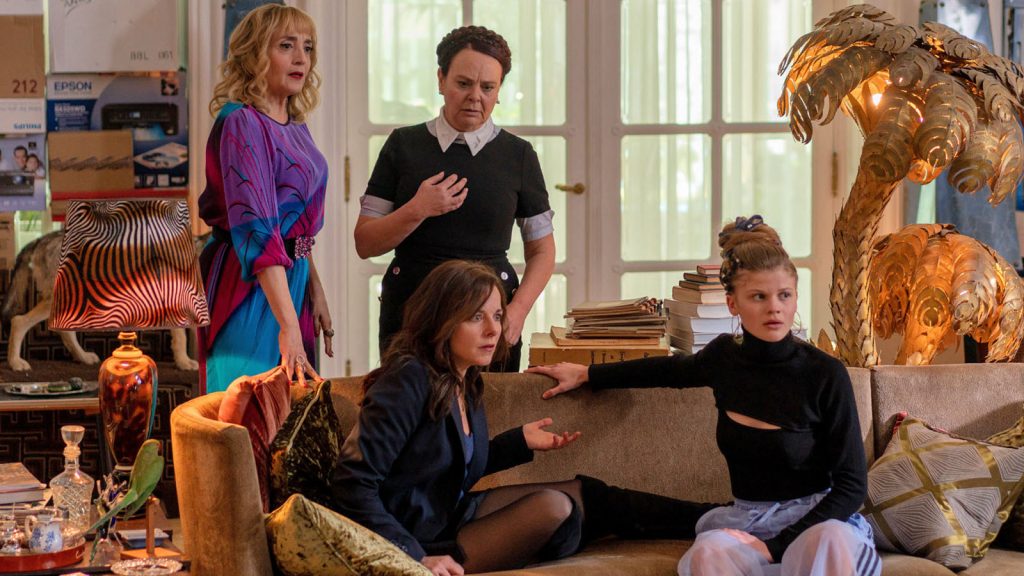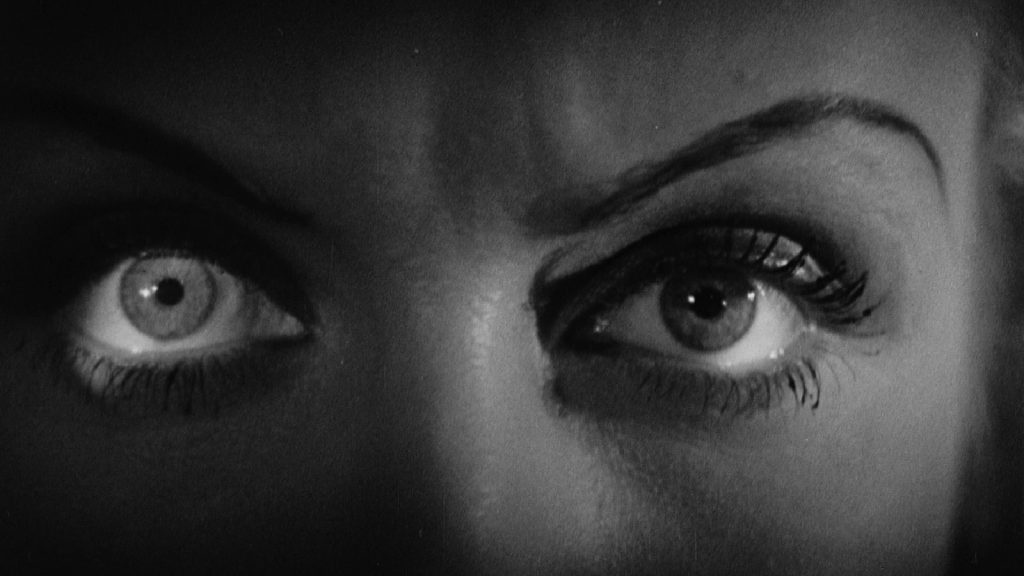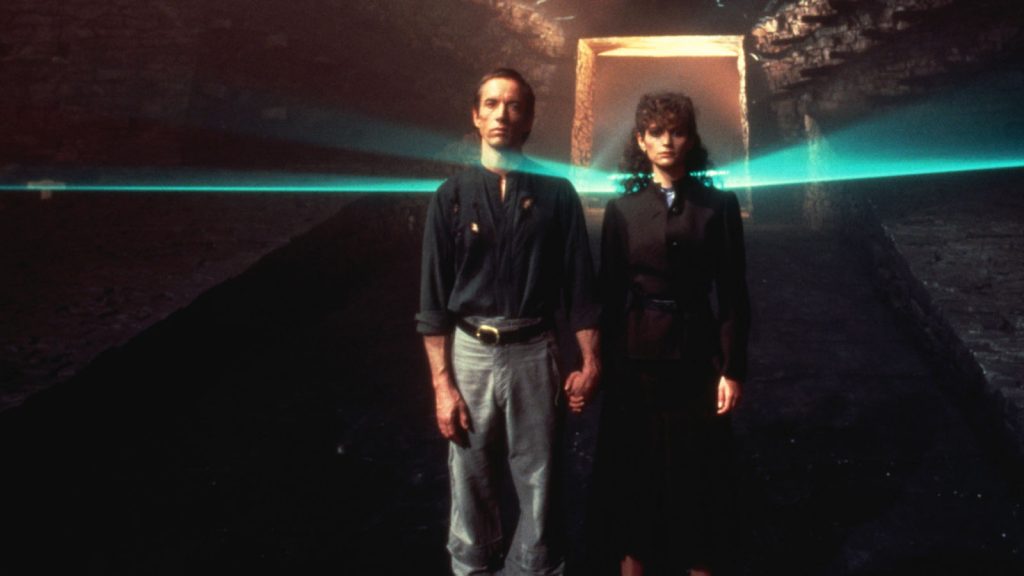
It’s often said that you can pick your friends but not your family. Yet in an age of mass communication, it’s never been easier to track down an absentee dad or quietly unfriend a despicable relative on Facebook. (At the very least, you can hide their shitty posts.) Sébastien Marnier’s twisting, visually inventive third feature, The Origin of Evil, explores the former scenario: a down-and-out sardine-factory employee, Stéphane (Laure Calamy), reconnects with her insanely wealthy father, Serge Dumontet (Jacques Weber), who’s been amassing unethical amounts of wealth and living on a semi-private island. At first, it’s a classic fish-out-of-water story: our humble protagonist politely blinks through slights hurled by her power-hungry half-sibling, George (Doria Tillier), and her father’s tacky shopaholic wife, Louise (Dominique Blanc)—a collection of rich psychos who make the white wine–drunk denizens of American reality TV look puritanical. In one of the film’s many masterful scenes, an initial family rendezvous is rendered not on a split screen but on a quintuple split screen: we see Stéphane, George, Louise, George’s Instagram-crazy daughter (Céleste Brunnquell), and the patriarch struggle through a tense dinner together. It’s a marvelous rendering of the worst kinds of gatherings: those dictated by blood. Serge, a man so macho that he’s given both of his daughters male names, has been weakened by a stroke and now it seems these assorted harpies are descending to take control of his companies and gleefully feast upon his bones. Serge sees a new opportunity to make things right with sweet Stéphane, and to prevent Louise and George from getting him legally declared mentally unfit and taking away everything he’s built.
However, as the film progresses, it becomes clear that these dynamics hide a more complicated yet predictable truth. Rather than being the put-upon père, Serge is a miserly bigot who has alienated his family through years of physical and emotional abuse. The intended inheritor of Serge’s empire, his son Frédéric, was driven away by his father’s homophobia; when Louise suggests that perhaps, like Stéphane, Frédéric will also return some day, Serge forcefully belts her across the face. (Despite his fainting spells, Serge can sometimes gather his constant, seething anger and be an asshole like he was in the bad ol’ days.) Serge’s connection to Stéphanealso changes. She’s not merely an ally but also a piece of ass: the family maid, Agnès (Véronique Ruggia Saura), almost catches them canoodling on the couch amid piles of Louise’s tacky home-shopping-network crap. In any other movie, this would pose a troubling question: is Stéphane, recently robbed and kicked out of her apartment, willing to do anything to get out of her wretched financial predicament?

As it turns out, Stéphane is used to doing anything to get by, as she’s not really the sweetie she seems to be. In fact, she’s not even Serge’s long-lost daughter Stéphane: her real name is Nathalie, and she’s stolen the identity and daddy complex of one of her many lovers (Suzanne Clément), who’s in prison. While she’s working over the Dumontets, Nathalie shacks up with another woman, Leila (Naidra Ayadi), a co-worker at the sardine factory. (Leila knows Nathalie’s proclivity for scamming people and flat-out asks her what the fuck she’s up to, which Nathalie playfully brushes off by burying her head in Leila’s lap.) Nathalie, hardened by circumstances that remain mysterious (or evil brain chemistry), is just as ruthless as the family she’s planning to join. As such, she can see the writing on the wall and, while pretending to be Stéphane at a hearing about Serge’s sanity, artfully switches teams and allies herself with the women. It’s a beautiful gesture—one that sends Serge into another well-deserved medical emergency. Although it’s all based on lies and deception, it suggests that Nathalie perhaps has something of a moral compass—or, at least, can see that these awful Dumontet bitches might not have been so awful were it not for Serge. (George has, after all, increased profits at Serge’s companies by 15 percent.)
But even this gets complicated when the real Stéphane, who obsessively draws Nathalie’s face from memory (and does a psychopathically excellent job), breaks out of jail after Nathalie denies one too many of her phone calls. The real Stéphane shows up at Serge’s island, demanding to see her father. Nathalie, fresh from her success in the courtroom, refuses to allow the real Stéphane to take what she’s worked so hard to claim. Cinematic tales of evil lesbians are hard to get right—it’s a terrible cliché that’s steeped in misogyny. Too often they are made out to be the bitches who hate men, haven’t yet met the right man to help realize their heterosexuality, or are uppity enough to upset the natural patriarchal order. The Origin of Evil exonerates the evil lesbians: here they are right, even when they do wrong. With magnificent pacing and reveals that harken back to classical Hollywood, it can be seen as a riposte to all the film noirs and Gothic thrillers that punished these purple threats. (Maybe Rebecca’s Maxim de Winter did have it coming?) Nathalie, sweet and conniving Nathalie, deserves to come out on top. She chose the right family, after all. 🩸

is the author of David Cronenberg: Clinical Trials. She is the former digital producer at Film Comment and the host of its podcast, as well as former VP of Digital at Harper’s Magazine.
Sébastien Marnier’s second feature may be cursed with a generic English title, but the film immediately dispels any semblance of the ordinary with one of the most attention-grabbing opening scenes in recent memory.
BY LAURA KERN | October 8, 2023
Stories told within the framework of family drama can sometimes resemble folklore—digressive, dark, suspiciously elliptical, patent fabrications that only bear hints of an ancient truth that has since been lost to time.
BY VIOLET LUCCA | March 25, 2022
The Substance opens with its simplest, most natural image: a raw chicken’s egg, the yolk yellow and dewy, lying flat on a white background. A long needle full of an unnaturally green fluid enters the frame...
BY VIOLET LUCCA | September 21, 2024

This pre-Code offering packs a lot of story into its typically brisk running time, with several plot threads weaving together a (not always successful) tapestry of spooky and criminal doings.
READ MORE >
BY ANN OLSSON | Month 00, 2021

In what could be the fastest-resulting rape revenge movie, a drunken lout brutally forces himself on Ida, the young woman who doesn't return his affections, during a party over Labor Day.
READ MORE >
BY LAURA KERN | Month 00, 2021

Beast is a lot of movies in one package - fractured fairy tale, belated-coming-of-age story, psychological drama, regional horror film - but above all it's a calling card for its leading lady, Jessie Buckley.
READ MORE >
BY LAURA KERN | Month 00, 2021